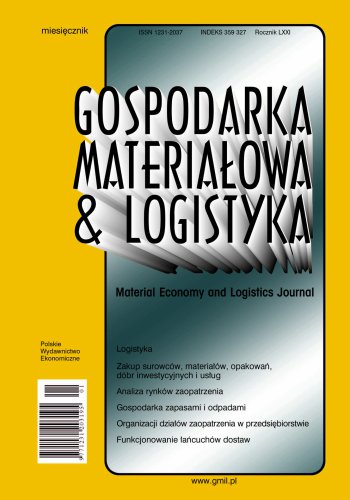The impact of selected aspects of knowledge management on the functioning of the enterprise
Knowledge and its management are the key success factors for enterprises operating on the market today. One of the main features of good management in terms of building unique competitive advantages is the company's ability to learn and transfer knowledge. Nowadays, knowledge is becoming - on a micro scale — a priority production factor and — on a macro scale — a determinant of technical progress. The potential benefits resulting from the implementation of the knowledge management system include: creating new products and brands, building the image, optimizing the use of resources, building effective internal and external relations, creating innovations and conducting research and development works. The aim of the article is to present the results of research conducted on a group of 105 companies in the context of the impact of selected elements of the knowledge management system on: the number of complaints, the number of hazardous events and accidents, work efficiency, the number of customers, the amount of staff turnover, and the number of ideas and improvements.
References
Bibliografia/References
Abernathy, W. J., & Utterback, J. M. (1978). Patterns of industrial innovation. Technology Review, 80.
Beijerse, R. P. (2000). Knowledge management in small and medium-sized companies: Knowledge management for entrepreneurs. Journal of Knowledge Management, 4(2), 162–179.
Boiral, O. (2002). Tacit management and environmental management. Long Range Planning, 35(3), 291–317. https://doi.org/10.1016/S0024-6301 (02) 00047-X
Brdulak, J. J., Guzik, M., Pawluczuk, A., & Bałaszczuk, A. (2004). Zarządzanie wiedzą w polskich przedsiębiorstwach. Oficyna Wydawnicza Szkoły Głównej Handlowej.
Calo, T. J. (2008). Talent management in the era of the aging workforce: The critical role of knowledge transfer. Public Personnel Management, 37(4), 403–416. https://doi.org/10.1177/009102600803700403
Connelly, C. E., & Kelloway, E. K. (2003). Predictors of employees’ perceptions of knowledge sharing cultures. Leadership and Organization Development Journal, 24(5), 294–301. R https://doi.org/10.1108/01437730310485815
Dajczak, K. (2008). Kulturowe uwarunkowania zarządzania wiedzą w przemyśle stoczniowym. W: Wiedza jako zasób strategiczny przedsiębiorstwa. Wydział Ekonomiczny UMCS.
Grudzewski, W. M., & Hejduk, I. (2011). Przedsiębiorstwo przyszłości. Zmiana paradygmatów zarządzania. Master of Business Administration, 19(1), 95–111.
Hansen, M., Nohria, N., & Tierney, T. (1999). What's your strategy for marketing knowledge? Harvard Business Review, (3/4), 106–116.
Karwowski, A. (2011). Zarządzanie wiedzą. Bezpieczeństwo Pracy, (11).
Kłak, M. (2010). Zarządzanie wiedzą we współczesnym przedsiębiorstwie. Wydawnictwo Wyższej Szkoły Ekonomii i Prawa. Kieleckie Towarzystwo Edukacji Ekonomicznej.
Koźmiński, A. K. (2005). Zarządzanie w warunkach niepewności. Wydawnictwo Naukowe PWN.
Lee, H., & Choi, B. (2003). Knowledge management enablers, processes, and organizational performance: An integrative view and empirical examination. Journal of Management Information Systems, 20(1), 179–228.
Leiblein, M. J., & Madsen, T. L. (2009). Unbundling competitive heterogeneity: Incentive structures and capability influences on technological innovation. Strategic Management, 30, 711–735. https://doi.org/10.1002/smj.746
Levy, M., Loebbecke, & C., Powell, P. (2003). SMEs, co-opetition and knowledge sharing: the role of information systems. European Journal of Information Systems, 12(1), 4–7.
McAdam, M., & Reid, R. (2001). SME and large organisation perceptions of knowledge management: comparisons and contrasts. Journal of Knowledge Management, 5(3), 231–241.
Nonaka, I., & Takeuchi, H. (2000). Kreowanie wiedzy w organizacji. Jak japońskie spółki dynamizują procesy innowacyjne (przekład). Poltext.
Perechuda, K. (2005). Dyfuzja wiedzy w przedsiębiorstwie sieciowym. Wizualizacja i kompozycja. Wydawnicwo Akademii Ekonomicznej im. Oskara Langego we Wrocławiu.
Polanyi, M. (1967). The tacit knowledge dimension. Routledge & Kegan Paul.
Porter, M. E., & Kramer, M. R. (2002). The competitive advantage of corporate philanthropy. Harvard Business Review, 80, 56–68.
Teece, D. J. (2000). Managing intellectual capital. Organizational, strategic and policy dimensions. Oxford University Press.
Tuomi, I. (1999). Corporate knowledge. Theory and practice of intelligent organizations. Metaxis.

